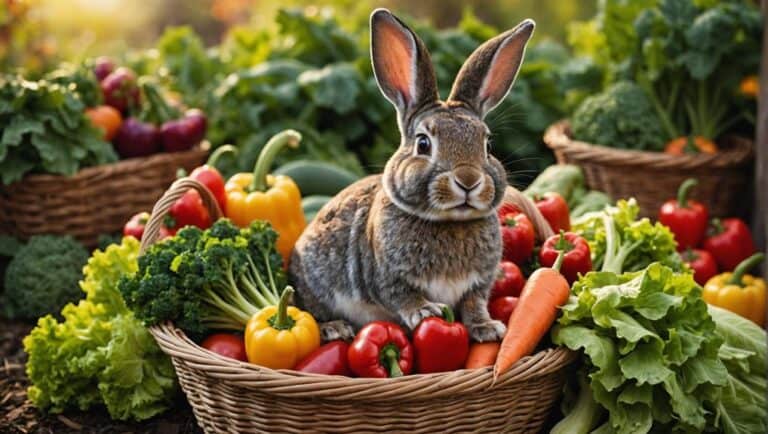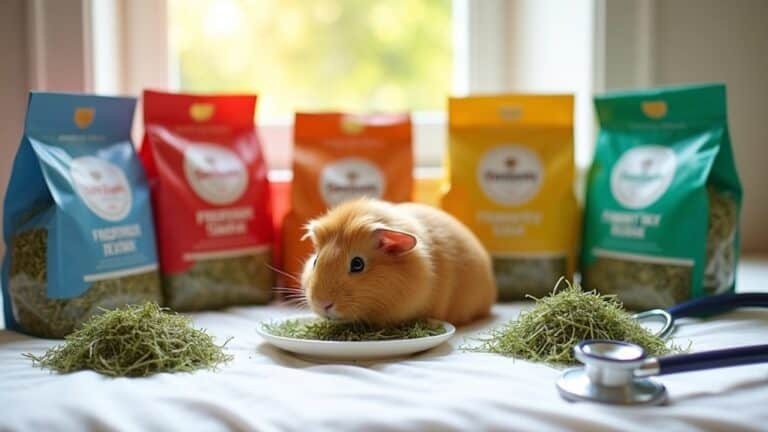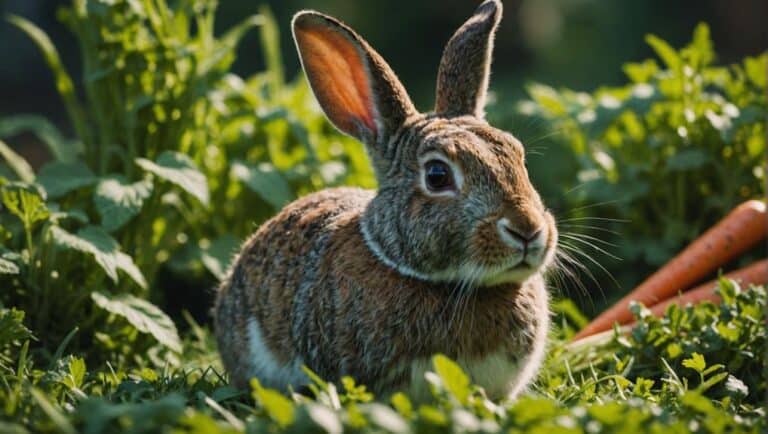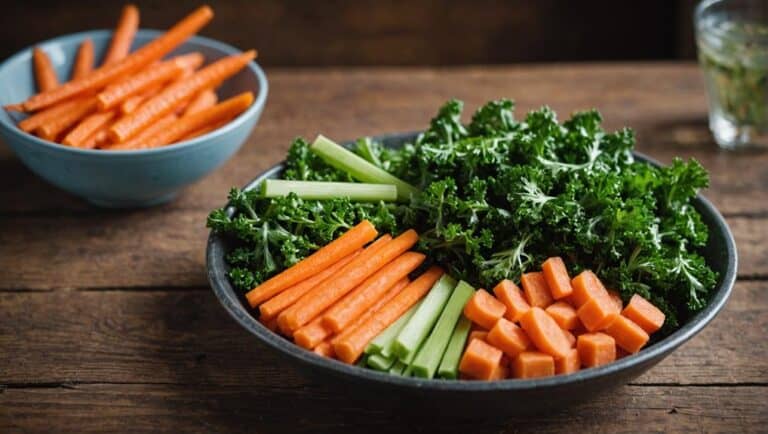When it comes to enhancing your rabbit's diet, it's time to ditch the old habits and explore new possibilities. By making small, intentional changes to what your furry friend eats, you can greatly impact their health and well-being.
But where do you start? Let's uncover the secrets to upgrading your rabbit's diet step by step, ensuring they receive the nutrition they need to thrive.
Contents
- 1 Key Takeaways
- 2 Understanding Your Rabbit's Dietary Needs
- 3 Transitioning to a New Bunny Diet
- 4 Incorporating Hay Into Your Rabbit's Diet
- 5 Choosing the Right Rabbit Pellets
- 6 Introducing Fresh Foods and Treats
- 7 Frequently Asked Questions
- 8 What Are the Best Steps for Upgrading My Rabbit’s Diet to Ensure It’s Healthy?
- 9 Conclusion
Key Takeaways
- Gradually introduce new foods to assess tolerance and prevent digestive upsets.
- Monitor for adverse reactions during the transition period for diet adjustments.
- Prioritize hay as 85% of the daily diet for fiber and digestive health.
- Consult a vet for guidance on selecting pellets and maintaining a balanced diet.
Understanding Your Rabbit's Dietary Needs
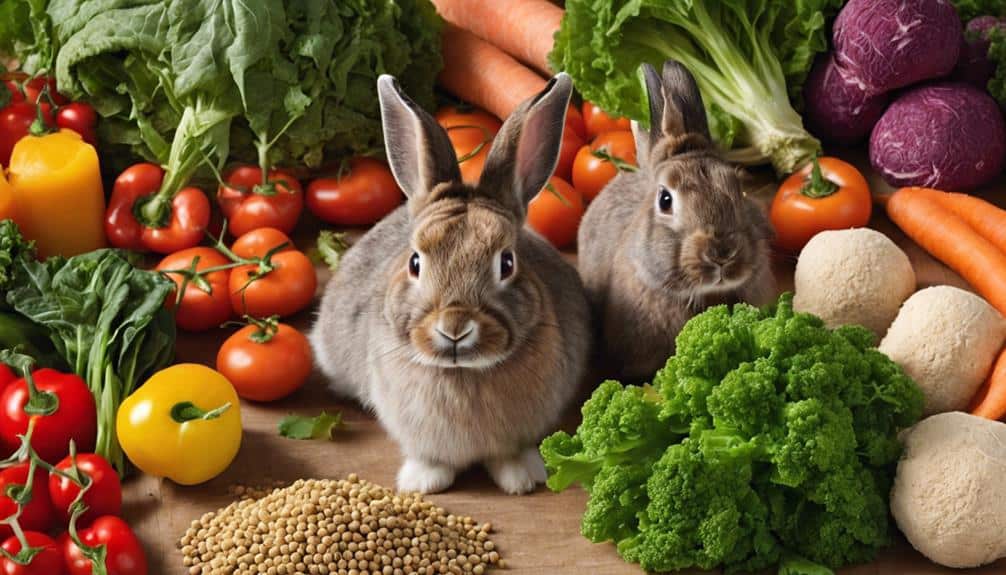
To guarantee your rabbit stays healthy and well-nourished, it's important to understand their specific dietary requirements. Rabbits have sensitive digestive systems that require a diet high in fiber. The cornerstone of their diet should be high-quality hay, such as timothy or grass hay, which aids in digestion and prevents gastrointestinal issues. Additionally, leafy greens should make up about 10% of their diet to provide essential nutrients and hydration. Pellets, comprising 5% of their diet, should be fed in moderation to prevent obesity and should contain timothy hay for added fiber.
Feeding your rabbit fresh vegetables and fruits can be a treat for them, but it's crucial to do so in small quantities. Fresh fruits, in particular, should be limited to 1-2 tablespoons per five pounds of body weight to prevent digestive upset. Always make sure your rabbit has access to fresh, clean water to aid in digestion and prevent dehydration. Proper nutrition plays a significant role in maintaining your rabbit's dental health, as a diet rich in hay helps wear down their constantly growing teeth.
Transitioning to a New Bunny Diet
When changing your rabbit to a new diet, gradually introduce fresh vegetables and fruits over 1-2 weeks to assess tolerance and preferences, monitoring for any digestive upsets or adverse reactions. Start by offering small portions of the new foods and observe how your rabbit responds. Keep a close eye on their fecal output and overall health during this shift period to make certain they're adjusting well to the dietary changes. If you notice any concerns or unusual reactions, consult a veterinarian for guidance on how to proceed.
To help your rabbit adapt smoothly, slowly decrease the amount of their old food while increasing the new foods. This gradual adjustment can help prevent digestive upsets and allow your rabbit's digestive system to acclimate to the fresh vegetables and fruits. By monitoring your rabbit closely and seeking professional advice when needed, you can guarantee a successful shift to their new and improved diet.
Incorporating Hay Into Your Rabbit's Diet
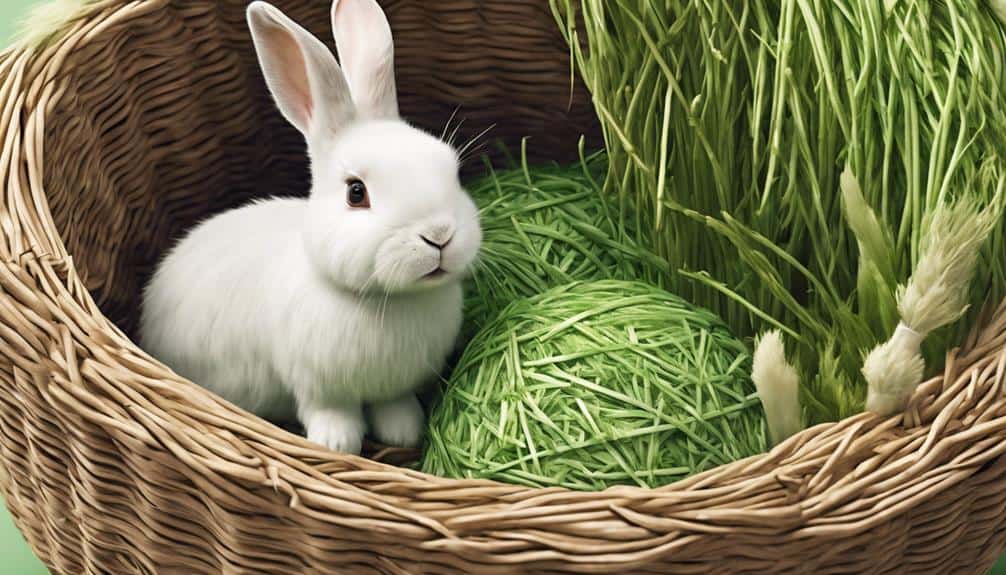
Incorporating hay into your rabbit's diet is essential for providing the necessary fiber and protein important for their digestion and overall well-being. Hay should constitute about 85% of your rabbit's daily diet. Opt for timothy hay as it's high in fiber, aiding in preventing digestive blockages and maintaining good dental health in rabbits.
Hay serves as a source of mental stimulation and assists in maintaining dental health, mimicking rabbits' natural grazing habits in the wild. Distinctly separate feeding hay for nutrition from bedding hay for comfort, ensuring your rabbits have continuous access to quality hay.
Hay plays a fundamental role in regulating your rabbit's digestive system, making it a fundamental component of their diet for the well-being and longevity. By prioritizing hay in your rabbit's diet, you're supporting their nutritional needs, digestive health, and overall wellness.
Choosing the Right Rabbit Pellets
Consider selecting rabbit pellets with timothy hay as the primary ingredient to guarantee your pet receives adequate fiber content for peak health. Rabbit pellets play an important role in providing essential nutrients such as vitamins, minerals, and proteins necessary for your pet's well-being.
When choosing rabbit pellets, it's important to avoid colorful and sugary options that can lead to health issues like obesity and digestive problems. Opt for pellets that offer a balanced diet and meet your rabbit's specific needs to promote overall health and longevity. Additionally, consult a veterinarian for guidance on selecting the best rabbit pellets tailored to your pet's individual requirements.
Remember to limit your rabbit's pellet intake to 2-5 tablespoons daily to maintain a healthy diet and prevent overconsumption. By prioritizing quality and nutritional value in your rabbit's pellets, you can contribute significantly to their overall health and happiness.
Introducing Fresh Foods and Treats
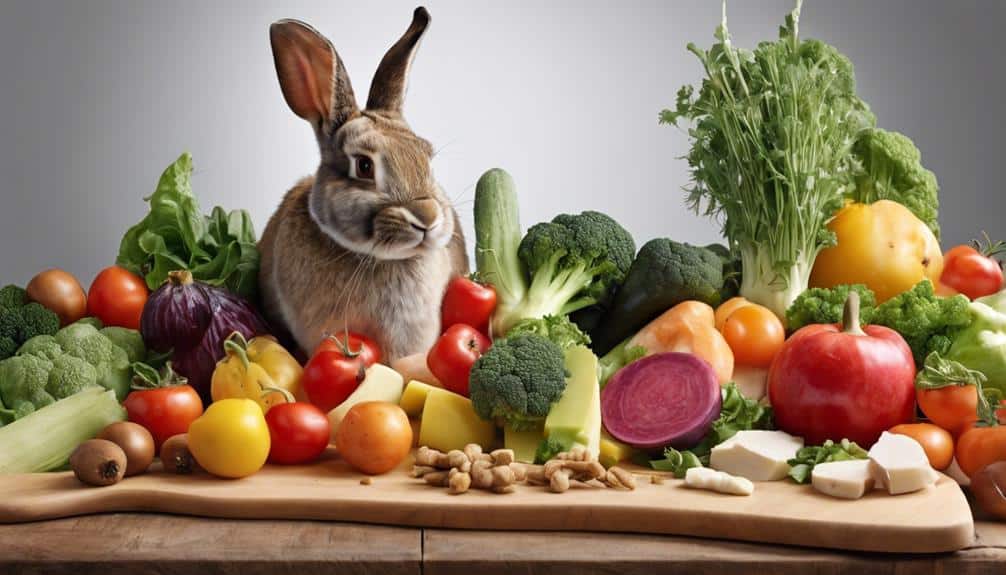
For excellent health benefits, gradually introduce fresh foods and treats into your rabbit's diet to diversify their nutritional intake and prevent digestive upsets. Start by offering small amounts of leafy greens such as romaine lettuce, parsley, or cilantro. These greens are rich in essential vitamins and minerals that contribute to your rabbit's overall well-being. Vegetables like bell peppers, carrots, and zucchini can also be introduced slowly to provide additional nutrients and fiber. When it comes to fruits, offer small portions of treats like apple slices or berries occasionally to add variety to their diet.
Remember to provide fresh water daily to keep your rabbit hydrated and aid in digestion. Alongside these fresh foods and treats, make sure that your rabbit has access to high-quality hay and pellets to meet their nutritional requirements. Avoid sugary treats and processed snacks, as these can disrupt the balance of your rabbit's diet. By introducing new foods one at a time and monitoring their response, you can identify any allergies or sensitivities your rabbit may have. Consider using hay-based treats for mental stimulation and as a healthier alternative to commercial treats.
Frequently Asked Questions
How Do You Feed a Rabbit Step by Step?
When feeding a rabbit, start with unlimited hay for digestion and dental health. Provide balanced pellets in moderation, fresh veggies, limited fruits, and constant water. Follow meal schedules, control portions, and focus on digestive health for a happy bunny.
How Do I Change My Rabbit's Diet?
When changing your rabbit's diet, focus on a gradual shift for best digestive health. Monitor their appetite, fecal output, and overall well-being. Offer a balanced diet with fresh greens, varied hay, controlled pellets, ample hydration, and seek veterinary guidance if needed.
What Is a Rabbit Diet Meal Plan?
A rabbit diet meal plan focuses on dietary requirements, balanced nutrition, healthy treats, digestive health, weight management, various hay types, fresh veggies, pellet choices, water intake, and portion control. It guarantees your rabbit's well-being.
What Do Rabbits Need in Their Daily Diet?
To meet their nutritional requirements, rabbits need a diet rich in hay varieties for fiber, fresh vegetables for vitamins, pellets for protein, and fruit treats in moderation. Make adequate water intake, supplements, and consider allergies for best digestive health and weight management.
What Are the Best Steps for Upgrading My Rabbit’s Diet to Ensure It’s Healthy?
Are you considering a healthy bunny diet switch? To ensure your rabbit’s well-being, start by gradually introducing new foods and observing any changes in behavior. Consult with a veterinarian for personalized advice on the best diet for your pet. Remember to incorporate fresh hay, leafy greens, and vegetables into their daily meals.
Conclusion
In conclusion, upgrading your rabbit's diet is like giving them a key to access their full health potential. By following the step-by-step guide provided, you can guarantee your furry friend receives the essential nutrients they need for the best well-being.
Remember to monitor their weight, introduce new foods gradually, and consult with a veterinarian for personalized dietary recommendations. With proper care and attention to their diet, your rabbit will thrive like a well-tuned engine.

